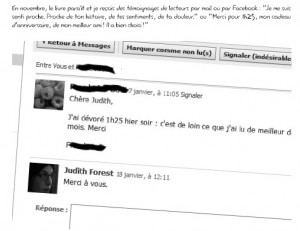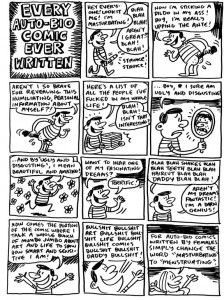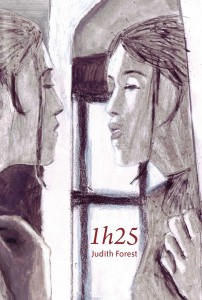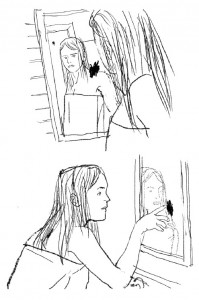Since roughly 2007, a number of artists in the francophone world who made their careers publishing autobiographical comics in the 90s began to diagnose what they perceived as a crisis in autobiography. Jean-Christophe Menu and Fabrice Neaud are the earliest and most vocal critics of recent autobiographical comics, which, they worry, have become too easily appropriated commercially by giant publishing houses while becoming locked into a codified genre that is depressingly safe and inoffensive. The two authors published an essay entitled “Autopsie de l’autobiographie” (2007). In it, Menu characterizes the crisis as “un appauvrissement, une caricaturisation vers une forme convenue de récit pseudo-intimiste tendant au dénominateur commun” (a thinning out, a caricaturization that leads to a pseudo-intimate, agreed-upon, narrative form that always tends towards the lowest common denominator). In the same essay, Neaud expresses concern that autobiographical comics seem to have lost their transgressive power: “[n]ous obtenons fatalement le résultat qui a fait florès: une forme d’autobiographie light, une autobiographie d’entre potes, cool et sympa, qui […] ne fait de mal à personne et pas davantage de bien.” (we fatally obtain the result, which now flourishes, a diet form of autobiography, friendly, nice, and cool, that […] neither hurts nor helps anyone).
Almost as if to illustrate their point, the Franco-Belgian comics world was shaken by its first highly publicized JT Leroy-style hoax a few years later during the 2011 festival d’Angoulême. Judith Forest, the author of an erotic confessional graphic narrative entitled 1h25, which had received critical acclaim from Arte (an artsy Franco-German television network) and les Inrockuptibles (France’s equivalent to Rolling Stone), was revealed to be a fiction invented by the editorial team at the Belgian press, La Cinquième Couche. What does it mean that Judith Forest, critically acclaimed comics artist, does not exist?
One could make any number of comments here about how an editorially driven autobiography, absent of an actual autobiographical subject, makes literal the crisis in autobiography. But the reality is even weirder than that. As it happens, the authors of the hoax did so not with the intention of driving up sales but rather that of generating discussion about the value of authenticity and the limits of autobiographical comics. They were, like Neaud and Menu, working to diagnose and treat what they perceived to be a problem in the autobiographical vein of comics publishing in the Franco-Belgian sphere. And I don’t think the editorial team expected what one of them described as “a poor graphic equivalent of literary autofiction” to have such huge market success. They meant for it to be poorly written and formulaic, a comment on how perceived sincerity and authenticity can lead readers to overlook formal and narrative weaknesses. But the French-speaking market gobbled it up, along with “Judith Forest’s” second volume, Momon, and the editors at La Cinquième Couche ended up essentially caught in their own trap while also proving their point. Will they feel compelled to continue publishing Judith Forest’s intimate confessions? And if they do, will the lesson about market-driven codified genres lose its power? Who wins? The editors at La Cinquième Couche or the market?

This all may be old news to readers of this blog, many of whom I know also keep track of the Franco-Belgian comics scene, but one discussion I find lacking in regards to the Judith Forest scandal concerns the association of autobiographical authenticity with male fantasized feminine sexual exploration. In the land of impoverished formulaic autobiographical narratives, the story that is imagined to have selling power is that of the sexually adventurous young woman. The all-male editorial team of La Cinquième Couche may or may not have succeeded in playing the market but whatever they accomplished, they did so on the body of a fantasized woman. If they had added a few lines about the gendering of authenticity to their elaborate critical discourse I might be more inclined to appreciate their hoax, but I am not convinced these editors are able to parse the critique of their porn-hungry male audience from that of the fantasized female author. They seem disdainful of both. Both elitist and misogynistic. And in that landscape of many-layered disdain, it seems the editors at La Cinquième Couche never thought to ask the question of whether their project might be exploitative of Judith Forest as a woman, real or not.
What do you think? Can a non-existent author be exploited as a sexual object? Has anything comparable occurred in the Anglo-American comics scene? Do you perceive a similar crisis in anglophone autobiographical comics? For the fun of it, I conclude by reposting Johnny Ryan’s comment on autobiographical comics published here in 2012.




So, let me see if I’ve got this straight, Michael. The editors at La Cinquième Couche assembled and published a comic falsely claiming to be autobiographical to show how shallow and formulaic the form had become. Then, when it was a success, instead of telling the audience they’d been conned and making their alleged point, they decided to publish a sequel?!?
It’s as if the computer security team you hired to test your bank’s firewall decided to just rob the bank blind instead. Yeah, I don’t think I’m sympathetic either.
Regarding whether or not the fictional author can be exploited, I say “no.” It’s erotic fiction written in the first person. You could argue that it objectifies women or that it cheapens sex, but no one is exploited here but the audience.
I don’t think fictional women can exactly be exploited…but of course art can represent women in various ways, and those representations can have ethical implications.
John: That is essentially what happened, although I should add that they did so artfully. Momon is a reference to a Francis Ponge poem about the self being nothing but layers of masks and the second volume is highly “meta” in a much more interesting way than the first, full of references to other autobiocomics and reflections on authenticity and the market. As interesting and bizarre as the whole hoax is, I’m still not sympathetic because I think their critique also implicitly targeted a number of female comics authors who have published autobiocomics in the past few years. There’s something terribly misogynistic about the whole endeavor that worries me. I like the computer security team metaphor!
As for the exploitation question, I agree with both of you, Noah and John. I think I phrased it that way just for the sake of provocation. No, a fictional woman can’t be exploited. But what remains is an exploitative structure. It’s a bit more than a question of representational ethics because here the sexualized fictional construct is also filling the author function.
Femininity is always considered fake or inauthentic, so there’s definitely some (or a lot of) misogyny in a hoax where the joke is that the woman isn’t real or authentic enough.
That really was an interesting way to continue the hoax. Not having read either work, I can’t really judge, but your concerns and Noah’s about the implied criticism of female authors make sense to me.
Momon (the sequel) also admits that “Judith Forest” doesn’t exist. It’s quite like a 60s pomo meta-fiction with the character discovering her existence as fiction.
They even hired an actress to play Judith for tv/radio interviews.
I think the real authors of the book were in one sense smart to use a female author for their hoax. I expect the type of story they tell, the young artist confessional, is going to generate more interest with a female character than a male character (especially in a more male dominated medium), where the male readers are hoping to get the sexy/erotic elements (but it is not really that explicit or erotic imho). Though, that in itself speaks to the broader cultural norms: how many sexy male confessionals can you name? In comics, we you get men and sex autobiographies they are tend to be about the women, or the men being lonely, or decidedly not trying to be erotic.
The drawing in the book(s) is lovely, which certainly contributes I think to its success. Also the style is very diaristic visually, clear based on real life sketches, and with abbreviated lines and details that add in the sense of visual recollection rather than constructed story.
Derik: Thanks for your comment. I especially like your observation about the visually diaristic style of the drawing, which adds to the autobiographical “reality” effect of the whole thing. Doesn’t it also makes the whole endeavor even weirder (lifelike self-portraits drawn by a non-existent artist!)? I think we might read into the editors’ choice of a diaristic drawing style a critique of many of the comics blogs that convey a similar sense of immediacy without depth of self-analysis (Neaud complains specifically about this tendency and justifies his use of a more studied, less immediate, drawing style).
There’s also a response to the huge popularity of autofictional confessionals in the literary market, a specifically French obsession that goes at least as far back as Pauline Réage’s Histoire d’O…. and it’s always women confessing their sexual indiscretions, etc. I find the whole phenomenon terrifically boring but I also worry when critiques of this strain of autofiction take on a misogynistic hue (of course there are plenty of good feminist critiques of this phenomenon coming out of France as well, but 1h25 is not one of them).
As one of the authors of that hoax, I can say that we just assumed the phallocracy and misogyny of the audience we were targeting. And we were laughing at them. (It seems to be a custom in the US to think that we Europeans are unable to see the consequences of our acts… They’d say the same when we did “Katz”…) (And it had little to do with “gender theory”, in fact. But everything to do with what actually sells in bookshops. And it has been a bestseller, so a real coup.)
we are planning a re-edition of the book (maybe). “l’intégrale”. with some more comments on the (media excellent) reception.
” I can say that we just assumed the phallocracy and misogyny of the audience we were targeting. And we were laughing at them”
Haven’t read the book…but that’s not a super compelling argument. You made your book misogynist because you figured the audience would be misogynist,and then you laughed at them when they bought your book, allowing you to make lots of money off of misogyny? I don’t really get how that makes the book not misogynist. Being cynical about it doesn’t mean your work isn’t misogynist. It just means it’s cynical and misogynist.
Again, haven’t read it. But your response sure doesn’t make me eager to do so.
I’d direct you to Jacob Canfield’s piece about why satire is not necessarily a defense of racism or sexism.
Well, just read it, then. We were just tired to see how the critique and the reception were so good with “girly” books, that are eventually an insult to every woman. Well, it is an exaggeration. Some of these books are good of course. We did one, as a statement and as a critique. No woman was injured during the process.
I think we did it pretty well. Neither was it an insult to the male naive audience. Some kind of an “exercice de style”.
Hey guys, I’m writing an intentionally stupid essay on media studies as a comment on how perceived critique can lead people to overlook intellectual weakness. Working title: Those “Judith Forest” Boys Sound Like the Absolute Worst.
Anyway. This piece was good.
Kim, ever hear of the Sokal hoax?
So…you’re saying that people overlooked the stupidity of the Sokal hoax because Sokal was supposedly engaged in critique? I guess I buy that.
“The stupidity of the Sokal hoax”
Noah, please. I will turn this car right around!
There’s critique and then there’s being an asshole. Here’s a handy rule of thumb: by definition, a hoax always involves the latter.
No, it doesn’t. The only ones who think so are the sorry tribe of fools whom the hoax has unmasked. Ahem, Kim…
And, Noah, the Sokal hoax wasn’t stupid: it’s the academic cretins who published it who are stupid…pace Caro…
The only people who were “unmasked” during this hoax, as far as I can tell, were its authors.
Autobiography is always a gesture of the self, even (and maybe especially) when it’s fake. The authors meant the work to hold up a mirror to a certain group of creators and their readers–to project outward–which demonstrates a fundamental misunderstanding of the form. It’s fascinating, isn’t it, to see how Xavier describes himself and his co-authors as sort of omniscient in the comments above. What does that tell you about him?
The reason I find this post so interesting is not in the question of whether or not you can exploit an imaginary woman. It’s because Michael examines the work, not in terms of what it was intended as (commentary, critique), but what it IS: an expression of the authors’ values and opinions about women, about comics, about a lot of stuff.
Yeah; I’ll go with Caro on that. Or with Eve Sedgwick. You don’t escape the closet by claiming you know what’s in the closet, and masks are trickier to play with than folks sometimes like to think.
I would have put *much* more into this blog post if I had known the comments were going to be be so rich and interesting. Kim’s insight into how faked autobiography reveals just as much, or even more, about about its author than its imagined audience–including that author’s bad-faith relationship with the audience–really has gotten my gears turning. And I’m also working through Noah’s comment that masks are trickier to play with than we like to think. Fabrice Neaud plays with masks and succeeds, but only through cruel honesty and self-analysis, not to mention a series of failures to play with masks. One voice missing from this discussion is Julie Delporte’s whose book, La Bédé-réalité: La bande dessinée autobiographique à l’heure des technologies numériques [Reality Comics: Autobiocomics in the Digital Age] http://collectioncolosse.com/en/ouvrages/ces_001/, manages to critique some of the same female autobiographers 1h25 might be taken to be mocking (comics diarists and bloggers, specifically) but in a feminist vein, and responsibly. Her book is unfortunately only available in French at the moment but I expect an English translation to be out soon. It’s really a great read. In any case, I’d be curious to hear Delporte’s take on the Judith Forest hoax.
I was thinking especially of Eve Sedgwick’s comment re the closet that one of the ways the closet works is “it takes one to know one.” Revealing someone else automatically means revealing yourself.
“how Xavier describes himself and his co-authors as sort of omniscient in the comments above”… look who’s talking… you may have a little look at what we published, it could maybe change your humble mind. “an expression of the authors’ values and opinions about women, about comics, about a lot of stuff.” Indeed. But as a reflect, you know. In a mirror, everything is reverted. – See more at: https://www.hoodedutilitarian.com/2014/12/can-a-non-existent-author-be-exploited/#comment-163568
Please don’t mind my awful English. I use to speak French or Spanish.
Both Julie Delporte and Fabrice Neaud know about Judith Forest. Fabrice liked it very much. He became one of the characters because he himself suggested it to me.
This is real interesting, thanks for writing about it! I hadn’t heard about any of this story before but there’s tons of food for thought in this article. I agree with the guy who said you can’t exploit a fictional author – you can exploit a certain eroticized view of women though, and the audience that holds it. Just watch a shampoo commercial, ya know? The exploitation angle seems like the least pressing thing about this whole story to me – I think the “crisis of autobiography” that everyone actually states is their point of interest here is a far more thorny and interesting question. This is the comics internet in 2014 so it makes sense the gender issue is what pops up as the topic of discussion, but maybe these dudes were just busy thinking about other topics? I mean, it’s a pretty funny intellectual exercise that managed to sell a bunch of copies in the bargain – not every art has to be on a side of the gender-politics conversation, especially when it has a completely separate agenda to serve. My guess is that Cinquieme Couch knew some soft-porn type of content would guarantee enough sales that their interesting li’l entry in an ongoing conversation about market forces wouldn’t be a loss leader, so that’s what they dialed up. (Also: if nobody buys it nobody cares about the point being made.) Doing a sequel to the book strikes me as just a totally cynical, sarcastic thing – “well, if you guys wanna pay us this money in order to prove our point even further, here ya go!”
Again, cool article about an interesting topic, thanks much for writing it.
Haha whoops, I just read a couple of the comments, I guess some of what I said gets addressed? Oh well, maybe some of it is still relevant. ALso, man! artists never come off good when they try and jump in to explain their work! Just let it speak for itself!
I think it’s relevant! Thanks for commenting, Matt.
Thank you Matt. You are perfectly right: it was NOT about the gender theory. This topic is (was…) not very important in Belgium. At the beginning, we just noticed that Ilan Manouach’s books were almost impossible to sale, while some funny girl book was selling so much. We wrote 1h25 and we showed it to our girlfriends, just to know. They immediately answered: a girl cannot possibly write like this! So we changed a lot of things, mainly words (touching instead of masturbating, for instance) and at the end, we were told it was still far too masculine. Well, as we are men, and as the audience is mainly male too, we decided to publish it anyway. We were talking about fiction, autofiction, autobiography, relevance, reception. Some of our friends were really mas at us. Jean-Christophe Menu, for instance: “what’s happening to La 5e Couche? How can they do such an awful book?” So we had to tell him the truth. We had fun. I was really doubting about the relevance of fiction, that needs a conflict, a drama. As a game, I can accept it.
Well, Menu is always complaining about something, anyway.
As Menu took it “au premier degré”, thinking it was a real author, a real “autofiction”, he was perfectly right to complain: it was quite a bullshit book. easy-reading book.
our purpose was to show how easy it can be to make a coup, within the book market. we where quite annoyed by it. so we just put all the commons elements that can be found in a best-seller, all together: a writing nice girl, a bit of eroticism, a bit of cleverness, so the reader can feel clever and have the impression to learn something, some polemic element, so that the media could easily talk about it, some banal neurosis that can produce easy identification… we mixed everything, and… it worked.
Xavier, have you heard of Naked came the Stranger:
http://en.wikipedia.org/wiki/Naked_Came_the_Stranger
…or of I, Libertine?
http://en.wikipedia.org/wiki/I,_Libertine
Comme le disait Gottlieb:
Rions UN PEU.
So…the fact that it worked doesn’t actually mean that Michael is wrong. The fact that you weren’t thinking about gender makes it more likely that there are problems around gender, not less likely.
I am sorry, but there is no english version of my text to be expected now, unless someone here wants to do it!
I am not good with commenting texts on the web, but this is ideas…
Thinking this book in terms of exploitation of women is to my opinion a victimization of women.
I would be curious to see how much money la 5e couche made with the book but I don’t think it’s can be called a “huge success”.
The book is not really good, even the authors agree :) !
And it has been quite quickly forgotten, and it’s probably not easy to find in bookstores right now. The fact that french media were interested into it when it came out only underlines the lack of critical thinking for comics in the medias. Depressing.
However, the performance that the book implies is interesting. 3 males writers wants to be a female author for once (there is definitely an act of performance in writing that kind of hoax, it’s a game also, playing the girl, and it’s not an innocent game). They don’t want to be whatever woman, but they want to be the image they have of a woman. So obviously it implies sexuality! I will let psychoanalysts keep on this discussion. And it’s where as woman we can get offended by these images of us that men have and pretend to be reality.
But it’s a good game to play, I would like myself to try writing a book as if I was a man.
The easy identification that Xavier talk about does not really work with readers. Seriously, I haven’t met someone who told me he identified with that character. And by identification I do not mean “to recognized oneself”, but I mean a larger idea (where I could identify with men also, of course). I didn’t identify myself because something is void, not really here, of course “fake”. But I can feel the same “fakeness” reading what we really call “autobiography” and is not a hoax. And that is why Judith Forest is a little bit a critic of what has SOMETIMES become, in the francophon scene, the autobiography in the last 10 years (with blogs, but not only with blogs), what Fabrice Neaud or Menu call the crisis, and what I tried to understand in my book.
There is another interesting idea in 1h25 which is I think related to the autobiographical crisis: Judith character meets and sleeps with figures of the comics scene (I don’t remember who? Florent Ruppert I think is one of them?). Does autobiography of comics artists drawings other authors creates a sort of starsystem of the authors? And does it function as people magazines or reality TV? Then, readers are interested into the books not because they identity, but because they are interested in their little stars…